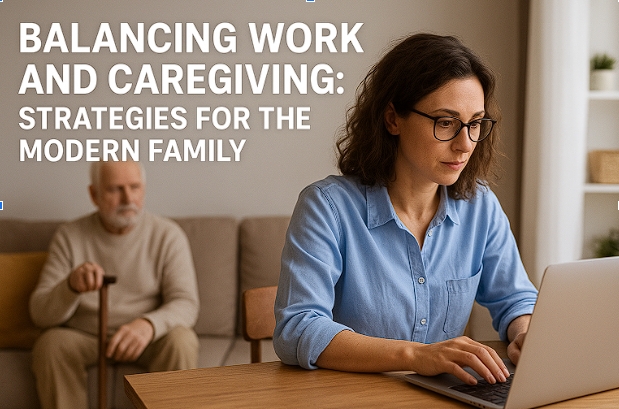Balancing a career with caring for aging parents is one of the biggest challenges many families face today. Known as the “sandwich generation,” professionals often find themselves juggling the responsibilities of raising children, maintaining a career, and supporting elderly loved ones—all at the same time. Without the right strategies, the emotional, physical, and financial strain can become overwhelming. Fortunately, there are practical steps that can help families maintain stability, reduce stress, and provide quality care without sacrificing professional goals.
The Growing Challenge of Work and Caregiving
As life expectancy increases and more adults live well into their 80s and 90s, family caregiving has become a critical issue. According to the AARP, nearly 53 million Americans provide unpaid care for aging loved ones, and many are also employed full-time. Balancing both roles can lead to stress, burnout, and lost productivity if proper systems aren’t in place.
For professionals, the challenge isn’t just about time—it’s about energy, emotional resilience, and the ability to maintain a healthy work-life balance. Recognizing the unique pressures of this dual responsibility is the first step toward creating a sustainable caregiving plan.
Open Communication at Work
One of the most effective strategies for balancing work and caregiving is maintaining open communication with your employer. Many companies now offer flexible work arrangements such as:
- Remote work or hybrid schedules
- Flexible start and end times
- Job-sharing or reduced hours during high-demand caregiving periods
By discussing caregiving responsibilities with HR or management, professionals may gain access to resources like employee assistance programs (EAPs), counseling, or even caregiver support groups. These benefits are designed to reduce stress and keep employees productive while honoring their family commitments.
Building a Family Care Plan
Caregiving is not a one-person job. Families can benefit greatly from creating a clear care plan that distributes responsibilities fairly. This may include:
- Assigning tasks (transportation, meal prep, medical appointments) among siblings or relatives
- Coordinating schedules to prevent last-minute stress
- Using digital tools such as shared calendars and reminder apps for medications or doctor visits
A structured plan ensures that the load does not fall entirely on one individual, which helps reduce resentment and caregiver fatigue.
Leveraging Professional Care Support
Sometimes, family alone cannot meet all the needs of an aging parent. That’s where professional caregiving services and care managers can step in. Services may include:
- In-home care providers to assist with daily activities
- Care managers who coordinate medical, legal, and financial needs
- Respite care to give family caregivers a much-needed break
- Transportation services to ensure safe travel to appointments
Bringing in professional support not only ensures high-quality care but also allows family caregivers to focus on work and personal well-being without guilt.
Prioritizing Self-Care
Many family caregivers neglect their own health while focusing on their loved ones. However, self-care is essential for long-term sustainability. Simple habits such as regular exercise, nutritious meals, and adequate sleep can make a significant difference in managing stress.
Additionally, making time for social connections, hobbies, or even short breaks during the day can help prevent burnout. Caregivers who care for themselves are better able to provide consistent and compassionate care for their loved ones.
Financial and Legal Preparation
Caring for aging parents often involves financial and legal considerations. Planning ahead can prevent last-minute stress and confusion. Families should consider:
- Reviewing long-term care insurance options
- Discussing advance care directives and healthcare wishes
- Consulting with financial planners and elder law attorneys for guidance
Having these conversations early ensures that important decisions are made thoughtfully rather than during a crisis.
Finding Balance in the Modern Family
Balancing work and caregiving may never be completely stress-free, but with preparation and support, it can be manageable. Families who share responsibilities, use professional resources, and prioritize both career and self-care can navigate this journey more successfully.
At the heart of caregiving is love and dedication, but it also requires strategy. By taking proactive steps, modern families can ensure that their aging parents are cared for with dignity while also maintaining their own personal and professional lives.






